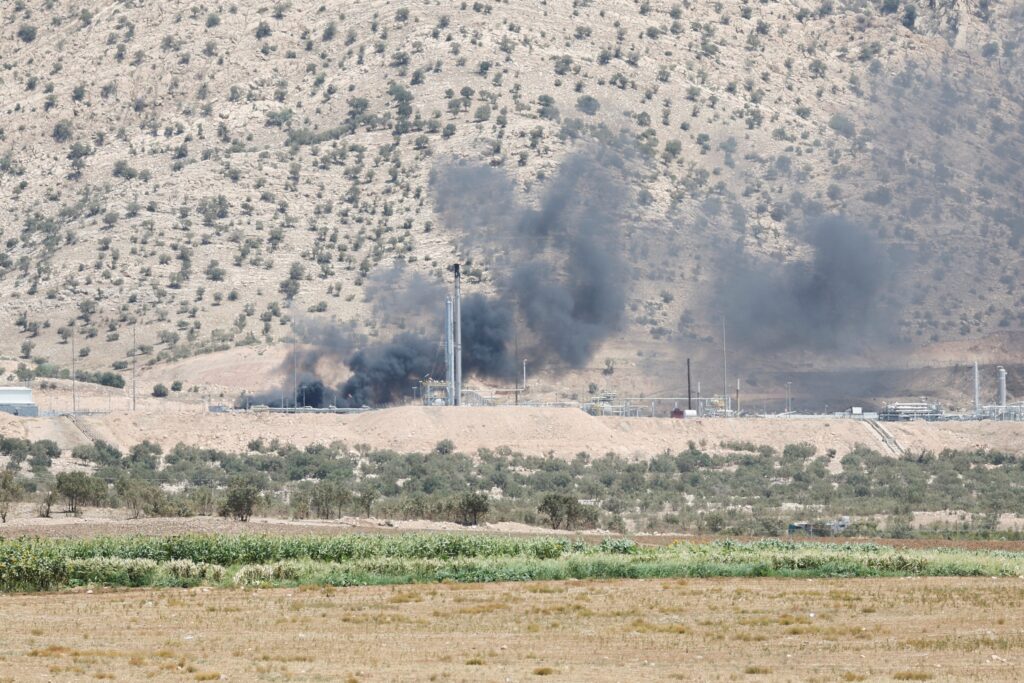Drone Attacks Kurdistan Oil Fields have caused a major disruption in Iraq’s semi‑autonomous Kurdish region, halting production across multiple sites. The recent wave of drone strikes has damaged critical infrastructure, forced field shutdowns, and raised serious concerns over energy security in the region.
Background of the Attacks
Between July 14 and 16, 2025, five major oil fields in the Kurdistan Region of Iraq (KRI) were struck by drone attacks. The affected fields include Sarsang, Tawke, Peshkabir, Sheikhan, and Khurmala. The Sarsang field, operated by HKN Energy, produces approximately 30,000 barrels per day and was forced to shut down following an explosion. Similarly, Tawke and Peshkabir fields, operated by Norwegian firm DNO ASA, experienced significant damage, leading to temporary suspensions of their operations. The Khurmala field, the largest in the region with over 100,000 barrels per day, was also attacked twice, damaging essential infrastructure such as water pipelines.
These attacks have collectively reduced the Kurdistan Region’s oil production by approximately 140,000 to 150,000 barrels per day, accounting for nearly half of the region’s total output.
Impact on the Region
Economic Consequences
The halt in oil production has dealt a severe blow to the Kurdistan Regional Government’s (KRG) economy, which heavily relies on oil revenues. With oil exports suspended since March 2023 due to disputes with the federal government in Baghdad, the KRG faces mounting financial challenges. The recent attacks exacerbate these issues, potentially leading to budget deficits and delays in public sector salaries.
Energy Supply Disruptions
The Kurdistan Region’s electricity supply is already strained, with residents experiencing limited access to power. The suspension of oil production further threatens the region’s energy security, potentially leading to prolonged power outages and affecting daily life.
Suspected Perpetrators
While no group has officially claimed responsibility for the drone attacks, preliminary investigations suggest that Iran-backed militias may be involved. The Kurdistan Regional Government has accused these groups of orchestrating the strikes, aiming to destabilize the region and disrupt oil operations.
The U.S. government has condemned the attacks, emphasizing the importance of safeguarding energy infrastructure and holding perpetrators accountable.Responsibility and Political Fallout
No group has publicly claimed responsibility, yet investigations point toward Iran-backed militias, possibly aligned with the Popular Mobilization Forces . The KRG has blamed these militias, while Baghdad has denied the allegations, citing a lack of evidence and cautioning against politically charged accusations

International Response
Calls for Accountability
International bodies, including the United Nations and the European Union, have expressed concern over the attacks. They have urged all parties to respect Iraq’s sovereignty and refrain from actions that undermine regional stability. Human Rights Watch has also condemned the strikes, highlighting the risks posed to workers and the broader implications for human rights.
Diplomatic Efforts
The federal government in Baghdad has pledged to investigate the attacks and hold those responsible accountable. Additionally, discussions are underway to resume oil exports from the Kurdistan Region to Turkey, aiming to stabilize the oil market and restore economic activities.
Broader Implications
- Security Risk: These strikes represent a dangerous escalation in attacks targeting civilian infrastructure and energy assets.
- Political Pressure: The shutdown magnifies tension between Baghdad and Erbil, each vying for control over oil exports and revenues.
- Urgency for Protection: International stakeholders—including the U.S.—have condemned the attacks and implored Iraq to improve security and safeguard foreign investments
Outlook and Future Considerations
The recent drone attacks underscore the vulnerability of critical infrastructure in conflict zones. While production has been temporarily halted, efforts are underway to assess the damage and plan for repairs. However, the persistent threat of further attacks poses challenges to restoring full operations.
The international community’s response will be crucial in determining the region’s path forward. Continued diplomatic engagement, support for reconstruction efforts, and measures to enhance security will be essential to mitigate the impact of these attacks and promote long-term stability in the Kurdistan Region.
Do follow us: Instagram
Read More: Qatar’s Real Estate Market Booms Amid Diverse Investments



